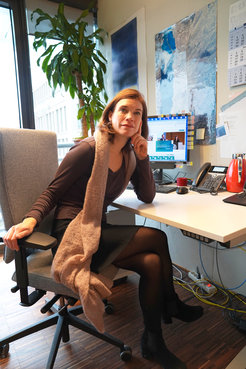Interview with Minerva's Head of Office
Minerva's Head of Office, Dr. Lou Bohlen, speaks about her role within the Minerva Stiftung. The interview contains her personal story with the Minerva Stiftung, her view on the institution as well as her tasks as Head of Office and her vision for the future

Interviewer: Dr. Bohlen, you have been the Head of Office for about two years. What was your first contact with Minerva and why did you decide to work for it now?
Dr. Bohlen: My first contact with Minerva was during my time as PhD student. I was myself a Minerva Fellow at the Minerva Center for German History (Tel Aviv University) in 2007 and 2008. When I look back, the importance the two years had on my scientific work as well as on my personal development is just overwhelming. When in 2016 the position of Head of Office of the Minerva Stiftung was available, I immediately realized the opportunity to continue to work in the field of Israel, which had such an impact on me.
Interviewer: For you as a former Fellow and current employee: What is the Minerva Stiftung? How would you explain Minerva to someone who has actually not yet heard about it?
Dr. Bohlen: The Minerva Stiftung offers funding for German and Israeli scientists to conduct research together and profit from a vivid exchange of high scientific quality. Minerva supports individuals and reserach groups, finances symposia and, with the Minerva Center's Programme in mind, makes high-risk research in Israel possible. Minerva stands for German-Israeli exchange, which is why all funding programmes are connected with some sort of exchange. The best-known one is the Minerva Fellowship Programme which has quite a prominent standing within our funding formats.
Interviewer: What are your duties as Head of Office?
Dr. Bohlen: I am involved in the management of all funding formats of Minerva: the Fellowship Programmes, the Minerva Center's Programme, the Minerva Schools, the Gentner Symposia and the Minerva Weizmann Programme. Since all of these programmes have quite a long tradition, it is very important for me to evaluate them regularly. We want to provide scientists and researchers with funding opportunities that offer attractive conditions and an up-to-date character. For example, this is why we have made the Fellowship Programme more family-friendly, because applicants with spouse and/or child(ren) should not suffer disadvantages in their scientific careers. For this reason, my duties are of a clearly strategic and conceptual nature and always associated with the question what and in which way Minerva should promote something and how this can lead to the emergence of new benefits and better synergy effects. Furthermore, I am also involved in all Israel activities of the Max Planck Society, which I handle in my role as Programme Officer for Israel and the Middle East - including several journeys for Max Planck and the Minerva Foundation to our cooperation partners in Germany and in Israel.
Interviewer: What is your vision for the future of the Minerva Stiftung?
Dr. Bohlen: Israel offers a fantastic scientific environment for research cooperation. I want the Minerva Stiftung to further promote exchange and create best funding opportunities for German and Israeli researchers working at the highest scientific quality level. The fact that people get to know and appreciate each other is one of the 'side' effects which does not only improve research, but also make life much more interesting.












